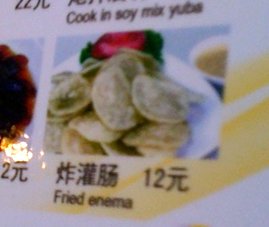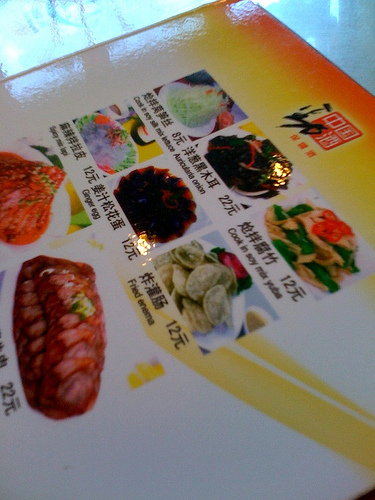Fried enema
« previous post | next post »
Drew Mackie has posted an item about this not very appetizing-sounding Chinese dish on his personal blog. He writes: "A bit of searching has led me only to find out that this food is not, in fact, enema content that is fried, but I don't know exactly what it is or how it might have gotten its name."

Here's the unsavory-sounding dish in the context of the original menu:

Drew asked for help from Language Log. Luckily this puzzle is particularly easy to solve.
The Chinese name of the dish in question is zhá guànchang 炸灌腸, which is a kind of sausage made of wheat flour stuffed into hog casings and fried. The last two characters, pronounced guàncháng, also have a completely different meaning, viz., "enema" or "give an enema" (literally, "to irrigate the intestine").
This is a good example of the spoken language being clearer than the written language — at least when one is relying on not-very-good machine translation.
Google Translate renders 炸灌腸 correctly as "fried sausage". Unfortunately, restaurants in China can no longer use that method to improve the lexicographical appeal of their English-language menus.
Drew said,
April 6, 2010 @ 12:53 am
Hey. Many thanks for posting this and clearing up how this thing came to be.
fs said,
April 6, 2010 @ 1:05 am
Surely the pronunciations "guànchang" and "guàncháng" are the same in the underlying phonemic/tonemic representation, and are just realized differently due to the former being a nounal compound ("closer") and the latter being a verbal compound ("more distant"), or something like that. No?
In which case the spoken language produces no more of a disambiguation over the written language than the spoken English language disambiguates over the possible meanings of the written English sentence/phrase "I saw her duck".
But I'm no expert in Chinese.
J. Goard said,
April 6, 2010 @ 1:18 am
@fs:
And why isn't the iconic relationship between semantic and phonetic/prosodic "closeness" part of spoken language disambiguation?
fs said,
April 6, 2010 @ 1:27 am
@J. Goard: It… is, I'd say. All I'm saying is that there's nothing particularly ambiguous about the Chinese writing system in this example.
Fluxor said,
April 6, 2010 @ 2:32 am
The modern 炸灌腸 contains no meat and requires no pig casings. Thus, translating it as a 'sausage' is a bit misleading.
Here's a video on how to make your own: http://tv.sohu.com/20080811/n258757945.shtml
Note that in the video link, the narrator pronounces this dish as "guàncháng" (yes, the same as enema), not "guànchang".
Tadeusz said,
April 6, 2010 @ 3:04 am
Bing's Translator gives the version: fried enema.
Brendan said,
April 6, 2010 @ 5:53 am
Fluxor is right — if you order 炸灌肠 in a restaurant in Beijing, you'll get deep-fried chips of rice(?) flour and a bowl of garlic sauce to dip them in. Cheap, cheerful, and – despite the name – unrelated to intestines or flooding thereof.
As for pronunciation: I've always heard the dish pronounced as zhà guànchángr, whereas the 灌肠 meaning "enema" is never erized.
empty said,
April 6, 2010 @ 6:39 am
Here is an explanation of sorts.
Terry Collmann said,
April 6, 2010 @ 7:51 am
The Mac dashboard widget translates 炸灌肠 as "explodes the sausage", which at least sounds edible, and at least isn't "explodes the enema" (ouch …)
Adrian Bailey (UK) said,
April 6, 2010 @ 7:59 am
fs: "I saw her duck." When you made that comment, I was sure you must be wrong, since there are different ways of enunciating it, but when I practised saying it, I discovered you're right.
Brendan: What is "erized"?
fs said,
April 6, 2010 @ 8:26 am
Adrian Bailey (UK): I can only assume he is referring to the Northern tendency to append 儿 (er2) to (mostly?) noun phrases (whereupon it is often written in pinyin simply as "-r") as "erization".
Andrew said,
April 6, 2010 @ 8:48 am
FS: So far as I know, the only verb phrase given an -er ending in the Beijing dialect is wan –> wanr, meaning "to play". (I apologize, I don't have Chinese characters on the computer I'm using at the moment.)
Anyone else aware of other exceptions?
Theophylact said,
April 6, 2010 @ 11:06 am
"And then I stitch it back together."
Julia S. said,
April 6, 2010 @ 11:39 am
So is this an analog to kishkes?
uberVU - social comments said,
April 6, 2010 @ 12:20 pm
Social comments and analytics for this post…
This post was mentioned on Twitter by LanguageCulture: RT @languagelog: Fried enema: Drew Mackie has posted an item about this not very appetizing-sounding Chinese dish on his personal b… http://bit.ly/dxJK9m…
Victor Mair said,
April 6, 2010 @ 12:55 pm
Laws are like sausages, it is better not to see them being made.
Otto von Bismarck
Aaron Toivo said,
April 6, 2010 @ 1:37 pm
Can someone please make a new LL post so this isn't at the top of the screen anymore? The title makes me slightly ill.
hanmeng said,
April 6, 2010 @ 3:13 pm
中文菜单英文译法 Chinese Menu in English Version renders "灌肠" as "Starch Sausage". Google isn't necessary.
Victor Mair said,
April 6, 2010 @ 4:50 pm
And then there's the Vertical Sausage Stuffer/Enema Machine made by Linyi Zhengtai Machinery Factory.
http://zhengtaimachine.en.made-in-china.com/product/UefQrPYTWpRl/China-Verti
cal-Sausage-Stuffer-Enema-Machine.html
Acilius said,
April 6, 2010 @ 5:02 pm
@Aaron Toivo: Be careful what you wish for, the next one might be worse.
murr brewster said,
April 7, 2010 @ 1:26 am
I've tried making it, but mine never comes out right.
Jesse said,
April 7, 2010 @ 10:17 am
If the dish really is made of wheat, it sounds like a form of seitan, which trumps dish names like "Starch Sausage".
I suppose starch could help in cases where the "sausage" or chips were made of rice.
Fluxor said,
April 7, 2010 @ 2:04 pm
Fried "enema" is not seitan at all. Very different consistency.
n0n3 said,
April 7, 2010 @ 2:36 pm
deny the shit
and then it's not
it's fertilizer
food for life
accept the shit
and then it is
it's excrement
leftovers
eat your leftovers
and shit uncertainty
word bombs away
Bob Violence said,
April 11, 2010 @ 7:42 am
FS: So far as I know, the only verb phrase given an -er ending in the Beijing dialect is wan –> wanr, meaning "to play". (I apologize, I don't have Chinese characters on the computer I'm using at the moment.)
Anyone else aware of other exceptions?
Is 聊天 liáotiān not rhoticized in Beijing, or are you not counting that as a verb phrase?
Bob Violence said,
April 11, 2010 @ 7:56 am
Nevermind, that's a verb-object compound…
What Does Palinspeak Mean? « Follow Me Here… said,
April 11, 2010 @ 12:01 pm
[…] Fried enema (languagelog.ldc.upenn.edu) […]
Drew said,
April 11, 2010 @ 7:04 pm
Hi all. Thanks so much for your input on this. It's very helpful for someone like me who knows little of Chinese. But I have one remaining question: It is a coincidence that a word that means "sausage" would so closely resemble the verb that literally translates as "to irrigate the intestine"? I ask because there's a certain visual resemblance between an intestine and a sausage, at least in Western culture. And I know the English word colon comes from a Greek word that can mean both "intestine" or "food/meat."
Again, thanks for all your help. You guys rock.
Pat said,
April 12, 2010 @ 10:53 am
AFAIK, 'guan' usually means to pour something into something. That's where you get 'irrigate,' and I can easily see that being extended to stuffing a sausage casing ('chang').
mollymooly said,
April 14, 2010 @ 6:25 pm
Wiktionary:
腸:
1.intestines 2.emotions 3.sausage
灌:
1.pour 2.water 3.irrigate, flood
Sausage casings are traditionally made from intestines, so there is no coincidence.
Hungry? Place your orders here - Page 2 - Android Forums said,
February 11, 2012 @ 10:12 am
[…] Originally Posted by argedion besides the duck hopefull never to be introduced to my table Perhaps you would like this dish? Fried enema. The Chinese name of the dish in question is zh